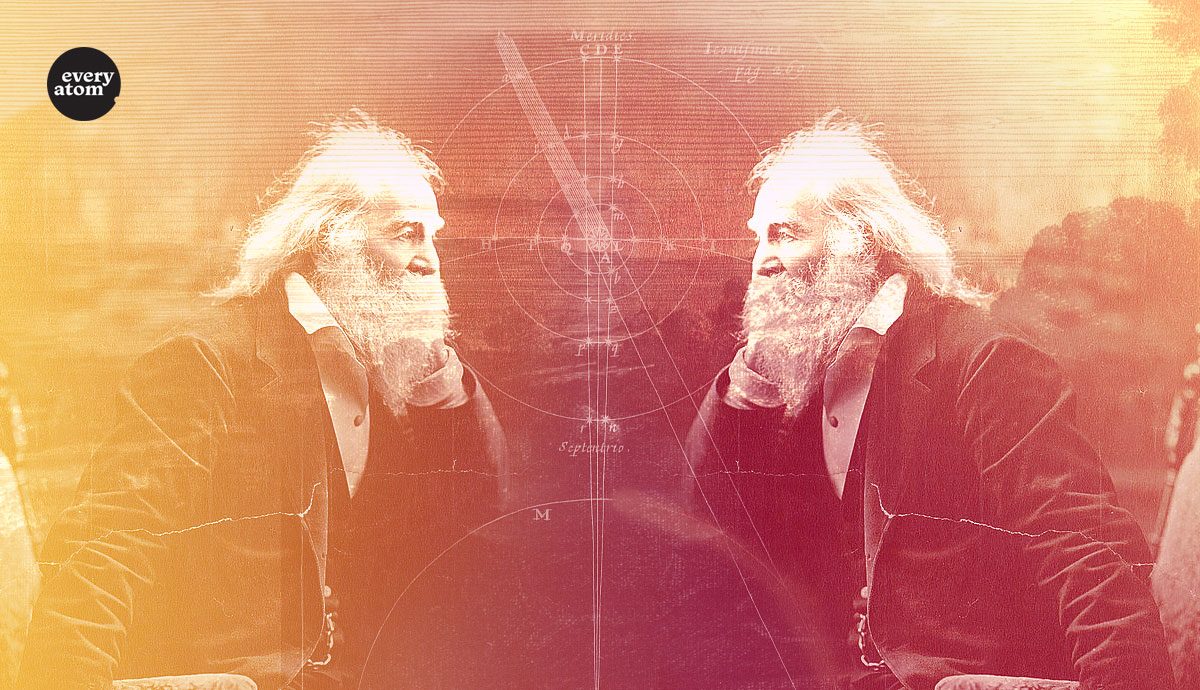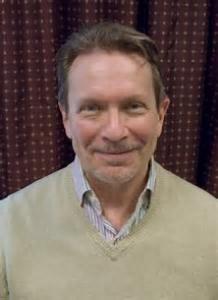Every Atom | No. 124
Introduction to Every Atom by project curator Brian Clements
It’s a commonplace to remark that Whitman’s major innovation was dispensing with meter and rhyme. Less often mentioned is his readiness to use a sort of collage technique, juxtaposing various observations from different contexts without any transition, the literary equivalent of channel surfing. Pound did the same thing in the Cantos, a notable aspect of his innovative Modernism, though “Song of Myself” had used the technique seven decades earlier. There is more. Even apart from his word coinages (for example, “Camerado” and “promulge”), we find strange, innovative syntax and word combinations throughout those early sections of Leaves of Grass that Whitman later would entitle “Song of Myself.” Consider this:
Creeds and schools in abeyance,
Retiring back a while sufficed at what they are, but never forgotten,
I harbor for good or bad, I permit to speak at every hazard,
Nature without check with original energy.
The first line is normal, but how to disentangle the syntax and meaning of the second line? The entire sentence, composed across four lines, is arresting, but hard to parse. It resembles some of the grammatical and syntactical fractures characteristic of the L=A=N=G=U=A=G=E poets of the 1980s.
It is accurate as well to speak of Whitman’s frequent indeterminacy of reference, as in these lines:
The smoke of my own breath,
Echoes, ripples, buzz’d whispers, love-root, silk-thread, crotch and vine….
I challenge anyone to find an external equivalent to the assembled particulars in that catalogue. Evocative, sonically appealing, it even so withholds any clear meaning.
One prominent feature of Postmodernism was the dissolution of binaries. Yet Whitman, who describes himself as “neither in nor out of the game,” constantly subverts binaries throughout “Song of Myself.” In one passage, he says he is all that surrounds him and that he is not. Also, “Do I contradict myself? Very well then, I contradict myself.” Or:
Clear and sweet is my soul, and clear and sweet is all that is not my soul.
Even more enigmatic is this:
Lack one lacks both, and the unseen is proved by the seen,
Till that becomes unseen and receives proof in its turn.
Using words in non-normative ways is a resource for him when he tries to represent extreme experience—that, as well as fertile images and metaphors heaped up in rhythmic, clamoring abundance. Consider:
I am cut by bitter and angry hail, I lose my breath,
Steep’d amid honey’d morphine, my windpipe throttled in fakes of death….
Or:
Parting track’d by arriving, perpetual payment of perpetual loan,
Rich showering rain, and recompense richer afterward.
Or:
Flaunt of the sunshine I need not your bask—lie over!
In the section later to be labeled as 42, he represents masses of semi-dead people and suggests that they lack true agency, his method, the suppression of the nouns that would normally be attached to their participles:
Here and there with dimes on the eyes walking,
To feed the greed of the belly the brains liberally spooning,
Tickets buying, taking, selling, but in to the feast never once going,
Many sweating, ploughing, thrashing, and then the chaff for payment receiving,
A few idly owning, and they the wheat continually claiming.
Personal identity has been replaced by actions portrayed as mechanical and futile, plus the ghoulish detail about these living dead consuming their own brain. The result is a sort of zombie apocalypse, rendered in ungrammatical sentence fragments.
I conclude with a few more striking examples of language used in non-normative ways, making for an evocative metalanguage of Whitman’s own invention:
My feet strike an apex of the apices of the stairs….
Look in my face while I snuff the sidle of evening….
I too am not a bit tamed, I too am untranslatable,
I sound my barbaric yawp over the roofs of the world.
Toss, sparkles of day and dusk—toss on the black stems that decay in the muck,
Toss to the moaning gibberish of the dry limbs.
The exact referents and a definite significance can’t quite be reached, and yet the untamed impression made, not merely a “yawp,” is powerful. I’m reminded of Stevens, a poet much influenced by Whitman; they are alike precisely in their readiness to invent new words and weld together odd word combinations. In Notes Toward a Supreme Fiction, Stevens says, “Life’s nonsense pierces us with strange relation.” Indeed. If it is the right kind of nonsense, it will pierce; and, if strange enough, it will bring us into relationship with psychological states not before charted. Call them the Open Road.
Recommended
Nor’easter
Post-Op Appointment With My Father
Cedar Valley Youth Poet Laureate | Fall 2024 Workshop







